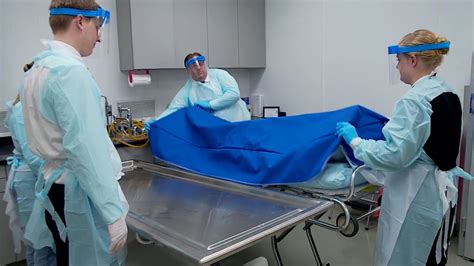Embark on a journey into the realm of mortuary science, a field that plays a pivotal role in honoring and memorializing the dearly departed. Texas, with its sprawling metropolises and diverse communities, offers a plethora of opportunities for individuals seeking to pursue a career in this dignified profession. In this comprehensive guide, we delve into the intricacies of mortuary science schools in Texas, providing you with the essential knowledge to make an informed decision about your educational path. Mortuary science, also known as funeral service, encompasses a wide range of responsibilities that extend beyond the traditional image of embalming and preparing bodies for burial. Professionals in this field provide compassionate care to bereaved families, manage the logistics of funerals and cremations, and serve as a vital link between the living and the deceased. According to the National Funeral Directors Association (NFDA), the mortuary science industry in Texas generated $1.7 billion in revenue in 2022, employing approximately 15,000 individuals. With an aging population and a growing demand for end-of-life services, the job outlook for mortuary science professionals remains promising. Selecting the right mortuary science school is a crucial step in your educational journey. Texas boasts a diverse range of institutions that offer programs accredited by the American Board of Funeral Service Education (ABFSE). These accredited programs meet rigorous standards, ensuring that graduates possess the necessary knowledge, skills, and ethical values to excel in the profession. When evaluating mortuary science schools, consider factors such as: Based on their reputation, academic rigor, and commitment to preparing students for successful careers, the following schools stand out as top choices for mortuary science education in Texas:
- Dallas Institute of Funeral Service (Dallas)
- Houston Community College (Houston)
- San Antonio College (San Antonio)
- Tarrant County College South (Fort Worth)
- Texas State Technical College (Waco)
Mortuary science programs typically span two years of full-time study, leading to an Associate of Applied Science (AAS) degree. The curriculum encompasses a balanced blend of classroom instruction and hands-on training in various aspects of the profession, including:
- Funeral Service Management: Funeral planning, directing, and coordination
- Embalming and Restorative Art: Body preparation and preservation techniques
- Pathology and Anatomy: Understanding human anatomy and disease processes
- Grief Counseling: Providing support and guidance to bereaved families
- Business Management: Marketing, accounting, and financial aspects of funeral homes
- Legal and Ethical Issues: Regulations and ethical considerations in the mortuary science profession
Practical training is an integral component of mortuary science education, allowing students to apply their knowledge and skills in real-world settings. Schools typically offer embalming labs, where students practice body preparation under the supervision of experienced instructors. Additionally, many programs require students to complete internships at funeral homes, gaining valuable hands-on experience in all aspects of the profession.
Graduates of accredited mortuary science programs are eligible for licensure as funeral directors or embalmers in Texas. Career opportunities in this field are diverse and include:
- Funeral Director: Managing funeral homes, coordinating funerals, and providing support to bereaved families
- Embalmer: Preparing bodies for burial or cremation, ensuring their preservation and presentation
- Crematory Operator: Managing and operating crematoriums, ensuring proper cremation and disposition of remains
- Cemetery Manager: Overseeing cemetery operations, including burial arrangements, grounds maintenance, and recordkeeping
- Grief Counselor: Providing support and guidance to individuals coping with grief and loss
Pursuing a career in mortuary science is a path that requires compassion, empathy, and a deep respect for the deceased and their families. Individuals who are drawn to this field are typically those who find fulfillment in serving others during their most vulnerable and challenging times. They possess strong interpersonal skills, a keen attention to detail, and a commitment to providing dignified and meaningful end-of-life services.
Choosing a mortuary science school in Texas is a significant decision that will shape your future career. By thoroughly researching your options, considering your individual needs, and embracing the compassionate nature of the profession, you can embark on a fulfilling journey in mortuary science, serving as a source of comfort and support to those who have lost loved ones.
